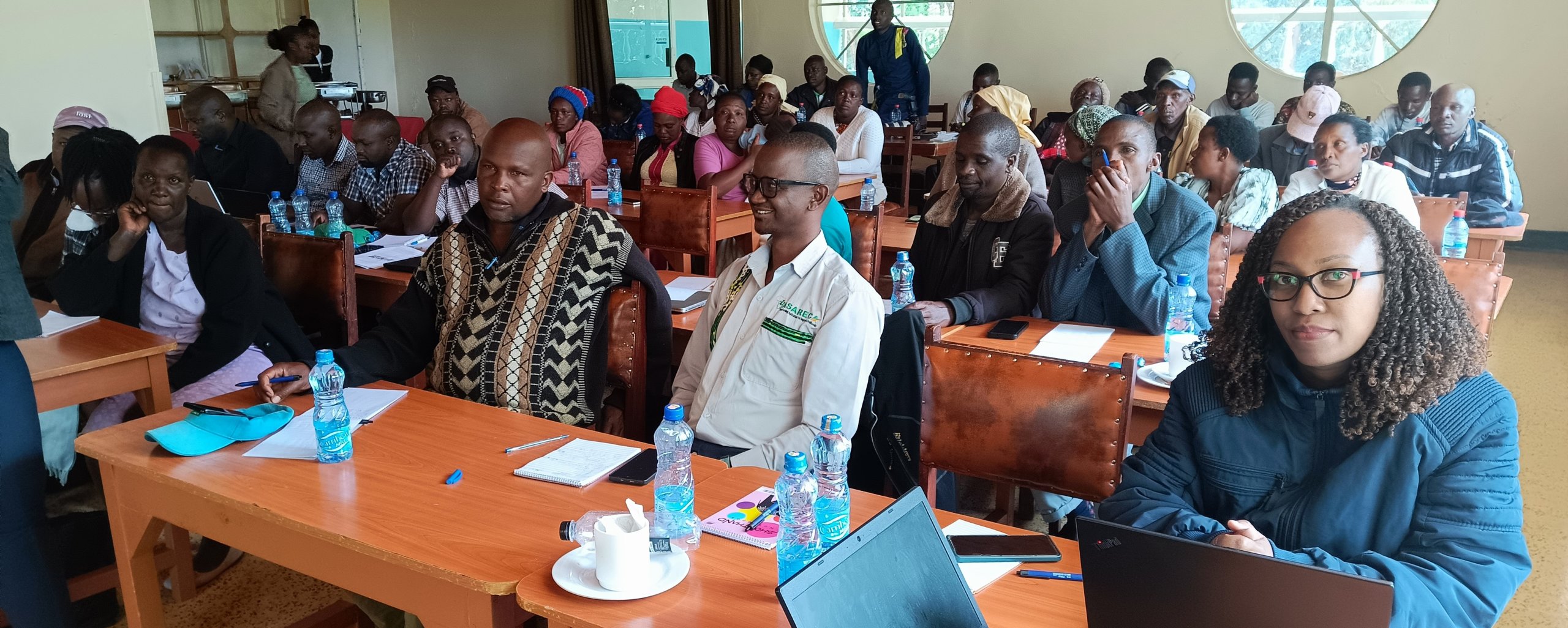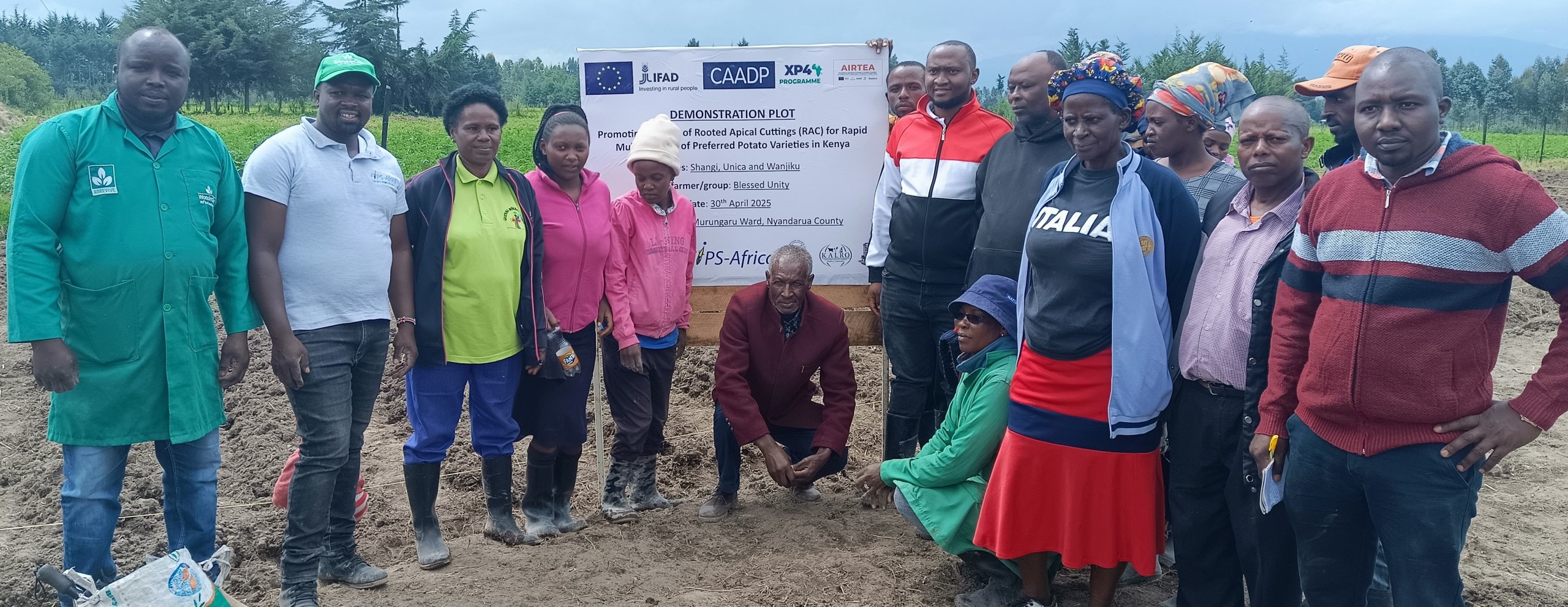ASARECA, KALRO scale out cutting edge potato innovations among Kenyan farmers, thanks to European Union, IFAD funding
BY BEN MOSES ILAKUT
NAKURU & NAIVASHA, KENYA—ASARECA and Farm Inputs Promotions Africa ( FiPs-Africa) on April 28 to May 1 supplied cuttings of 26,000 farmer preferred potato varieties including Shangi, Unica, and Wanjiku, 200 kgs of fertilizer and assorted pesticides to farmers and stakeholders in Marioshoni, Elbergon in Nakuru County and Murungaru in Nyandarua county.
ASARECA and partners KALRO, FIPs’ Africa, Egerton University and the National Potato Council of Kenya (NPCK) are camped in Marioshoni, Elbergon in Nakuru County, and Murungaru, Nyandarua in Naivasha, Kenya to promote the dissemination of rooted apical cuttings (RAC) technology for multiplication of farmer preferred potato varieties.
ASARECA and partners supplied cuttings of 26,000 preferred potato varieties including Shangi, Unica & Wanjiku to the farmers
RAC technologies for scaling
“We are supporting the farmers to establish demonstration plots using RAC technology to multiply the market demanded potato varieties to members of potato cooperatives and innovation platforms in Nakuru and Nyandarua in Kenya,” said Dr. Joshua Okonya, ASARECA’s Programme Officer-in-charge of Technology and Innovation, who is also coordinating the regional initiative. “These activities are meant to scale the production of quality seed and eventual uptake of this new technology at scale.”
He explained that ASARECA’s value addition to Agricultural Research for Development in its role of bringing together various stakeholders, resources, and competencies to make the best of innovations in agricultural research. “The collaboration of KALRO—a national research institution with FIPs-Africa—an extension organization, Egerton University—an institution of higher education, and ASARECA—a sub-regional organization of the Governments is significant in taking technologies to the ultimate clients—the farmers,” Dr. Okonya stressed.
The promotion of RAC is meant to scale the production of quality seed & uptake of the new technology at scale
Contribution to global targets on food security
ASARECA Programme Officer for Policy , Ms Julian Barungi noted that by working with researchers and development agencies, the farmers of Nakuru and Nyandarua are refining and embracing the technologies and contributing to national and global development goals, especially goals that are made possible through agricultural innovation. The consortium partners also provided farmers and value chain stakeholders training on the benefits of RAC for seed production and on good agronomic practices for seed potato production. This is in addition to practical demonstration sessions and actual establishment of potato plots of identified varieties using RAC in farmers’ fields.
Farmers encouraged to multiply varieties
The technical teams from ASARECA, KALRO, Farm Inputs Promotions Africa (FiPs-Africa), Egerton University, and the National Potato Council of Kenya (NPCK) encouraged the farmers to multiply varieties for scaling. The targeted members of cooperatives in the two countries include farmers, agro-input dealers, ward agricultural officers, seed multipliers, and village-based agents. They have been working with KALRO and Egerton University under the “Technology Transfer through Innovation Systems: Enhancing Smallholder farmers’ capacity for profitable and sustainable potato production” project.
The farmers and value chain stakeholders also received training on the benefits of using RAC in addition to practical demonstration sessions and actual establishment of potato plots
Opening bottlenecks to quality seed
According to Ms Peris Muthoni Wanjau, the Programme Officer FIPs Africa, an extension service provider promoting PAC in Kenya for rapid adoption, most farmers are unable to access quality seed from the seed merchants, making them to opt to recycle own saved seed of poor quality. “FIPs Africa increases accessibility of quality seed by providing propagated plantlets developed at a greenhouse to their doors step through village-based advisors and lead farmers,” she explained. “This way, we are able to reach small scale farmers, giving them the ability to generate their own quality seed from pre-basic seed, which they are able to multiply to basic seed before it transitions to generation 1 and generation 3 seed.”
Training on Best practices
According to Mr. Elias Kamau, the KALRO scientist who has been instrumental in providing backstopping the AIRTEA project and providing training to farmers, one of the main challenges that farmers face in Kenya is access to quality potato seed. “Poor seed leads to poor harvest. Quality seeds have the potential of increasing yield by 50%,” Said Dr. Kamau. “It is for this reason that we as a consortium are providing highly quality seed certified by the relevant authorities, from which we expect double harvest is expected from this initiative.”
The initiative is meant to empower farmers to generate their own quality seed from pre-basic seed to later stages
The ASARECA-coordinated initiative, which has already seen farmers in Rwanda receive a similar kitty suitable to their agroecology, is supported through the Comprehensive Africa Agriculture Development Programme ex-pillar IV (CAADP-XP4) Programme financed by the European Union under the Development Smart Innovation through Research in Agriculture (DeSIRA) initiative and is managed by the International Fund for Agricultural Development (IFAD). The initiative directly contributes to CAADP-XP4 project activities focusing on strengthening capacities of innovation platforms to scale up proven CSA Technologies, Innovations and Management Practices (TIMPs). It also contributes to other CAADP-XP4 outputs including establishing and implementing multi-stakeholder partnerships for innovation, promoting policies in support of climate-relevant agriculture and food systems transformation, increasing investments and advocacy and market linkages among others.
The initiative is supported under the CAADP-XP4 Programme financed by the European Union and IFAD as well as the Organization of African, Caribbean & Pacific States (OACPS) via the ACP Innovation Fund also financed by the EU
Downstream activity
The activity is a follow up of an earlier training on Best Agronomic Practices under the Strengthening Agricultural Knowledge and the Innovation Ecosystem for Inclusive Rural Transformation and Livelihoods in Eastern Africa (AIRTEA) project supported by the Organization of African, Caribbean, and Pacific States (OACPS) through the ACP Innovation Fund, which is also funded by the European Union (EU). It contributes to AIRTEA project activity on strengthening capacities of youth and women involved in multi-stakeholder Innovation Platforms (IPs). The AIRTEA project is implemented by a consortium consisting of FARA, ASARECA and EAFF.
ASARECA & partners work with farmers and complementing stakeholders through Innovation Platforms for technology adoption
Background and context
Since 2008 ASARECA has been promoting the use of Innovation Platform (IP) approach as a framework for scaling out its proven gender responsive and climate smart agricultural Technologies, Innovations and Management Practices (TIMPs) in its 15 member countries. ASARECA has been providing oversight and technical backstopping to key stakeholders involved in facilitation of agricultural commodity-based IPs in ECA. This includes strengthening the capacity of commodity-based IPs to enhance technology demand articulation and prioritization of research action and scaling of innovation at regional, national and sub-national levels.
Under the AIRTEA project, it was established that the most preferred varieties by smallholder farmers in Kenya were Shangi, Unica, Wanjiku, Sherekea and Markies among others. However, the supply of these varieties is still low and cannot match the current demand. As a result, farmers still use their own saved seed, which have low yields and are prone to diseases.









